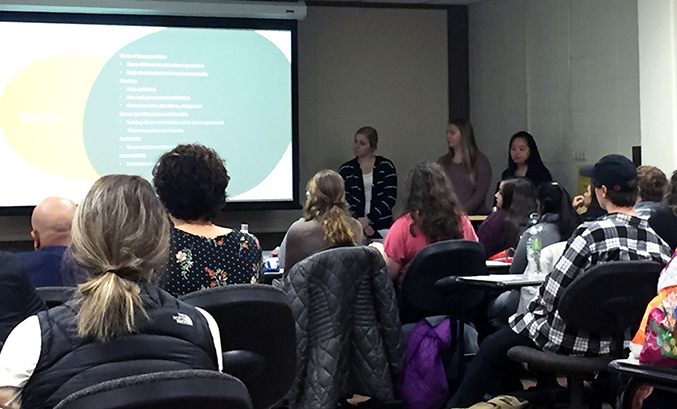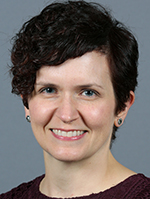Half of all seniors living alone report being lonely, which has been associated with declines in physical and mental health.
University of Wisconsin-Stout human development and family studies students in the Middle to Late Adulthood class taught by Amanda Barnett, associate professor, recently presented research to the Aging and Disability Resource Center of Dunn County. They evaluated ADRC programs and resources and provided suggestions.
One potential idea to combat loneliness in seniors would be to implement a Friendly Visitor Program. This would allow trained volunteers, including UW-Stout students, to visit seniors and do an activity such as play a board game, watch a movie, talk, help with household chores or do crafts. Volunteers could benefit as well by reducing their stress and creating a sense of purpose.
Students addressed the need for transportation for older adults because 21 percent of Americans over 65 do not drive. Seniors desire flexible transportation, with most wanting private over public transportation. About 40 percent of rural areas have no public transportation, affecting how seniors make appointments or engage socially.

Students also suggested elder and caregiver support groups. Over-the-phone support groups allow a safe place for caregivers to be heard, valued and cared about, and they make one-on-one support possible for those uncomfortable in groups. Online support is a possibility as well. Facebook secret groups could be a place, around the clock, where caregivers connect with others in similar situations. Support groups can help caregivers feel less stressed and provide educational and emotional support. Elder support groups can help seniors feel connected and prevent feelings of isolation and loneliness.
Students also addressed supporting aging veterans; the U.S. has 20 million, and about 46 percent are over 65. Veterans need help with transportation and treatment costs as well as access to mental health services and resources because post-traumatic stress can hit years after they served. Peer-to-peer support including veteran coffee socials and peer social groups have shown to be beneficial, the students learned.
“Overall I was very impressed by the depth of research the students did,” said Sara Olinger, ADRC manager. “From here I plan to do some grant writing to expand volunteer drivers that would have more flexible hours and to create some home visiting, so volunteers can do home visits. I was really excited about some of the different technology to reach out. We should get right on that. It would be a more convenient method of communication.”
 Barnett is looking forward to working with the ADRC to determine the next step and how students can help implement community projects. “My hope is for students in this class to do more service learning in the community,” Barnett said.
Barnett is looking forward to working with the ADRC to determine the next step and how students can help implement community projects. “My hope is for students in this class to do more service learning in the community,” Barnett said.
The students did a fantastic job with their research and shared it with messages that were positive and empowering — and looked at later life as a time of growth, Barnett said. It’s important to share students’ research, she noted. “We want to be a benefit to the community while developing our skills in class,” she said.
MaKayla Pederson, senior human development and family studies major from Chatfield, Minn., worked on researching home visitor programs for the class and is glad the information will go to a county agency. “It made me work that much harder,” Pederson said. “It’s something they can benefit from and older adults can benefit from too. I enjoyed learning about seniors and reducing their chances of loneliness.”
Pederson added that Barnett did an excellent job teaching the course, supporting the research and encouraging students to expand their learning.
Amanda Ewer, senior human development and family studies major, studied the issue of transportation for seniors. “I think it’s cool we’re not just learning; we are using the information to help the ADRC,” said Ewer, of Lake Holcombe. “There is an end goal with the research.”
The human development and family studies undergraduate program at UW-Stout has been reviewed by the National Council on Family Relations. It has been recognized as an NCFR CFLE-approved program offering coursework covering the content required for the Certified Family Life Educator designation. Graduates of NCFR CFLE-approved programs qualify to apply for the CFLE designation via an abbreviated application process.
UW-Stout is Wisconsin’s Polytechnic University, with a focus on applied learning, collaboration with business and industry, and career outcomes.
###
Photos
UW-Stout human development and family studies students recently presented research to the Aging and Disability Resource Center of Dunn County. The students evaluated programs and resources and provided suggestions to the agency.
Amanda Barnett




